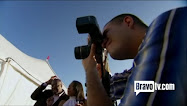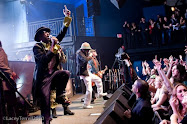 A Yes-and-No Answer
A Yes-and-No AnswerReviewed: Cafe Tacuba's Sino
By Alfredo Flores
Photo Credit LuiSFher Gallo
Posted: October 17, 2007 Washington City Paper
Sino
Café Tacuba
Universal Music Latino
It's unlikely that one band is capable of encapsulating three decades of English-language rock, much less in Spanish. But for rock en español pioneers Café Tacuba, arguably the most critically acclaimed Latin rock band of recent memory, tackling such challenges is nothing new. On Sino ("yes/no" or "but instead"), its first studio album in four years, the Mexico City quartet combines odes to late-period Beatles, heavy synthesizer and cheesy sounds of '80s rock, and the pop-ish Latin rock they've helped establish soon after their formation in 1989. Encompassing all these instincts is "Volver a Comenzar" ("Starting Over"), the album's first single: A melodic deep bass strum sets up a light mood before heavy synthesizer riffs establish a spacier tone. A calming, Beatlesque "uuuhhh uuuhhh uuuhhh" chorus ensues, as lead guitarist-vocalist Rubén Isaac Albarrán Ortega sings in his trademark nasa
 l voice: "Si volviera a comenzar/No tendría tiempo de reparar/El agua derramada está/La sed que siento/No saciará" ("I would start all over again/I wouldn't have time to repair/The water spilled/The thirst I feel/Will not be satisfied"). Café Tacuba (named after a coffee shop in downtown Mexico City) helped transform rock en español, shifting to pop, rock, grunge, and electronica, while taking cues from Mexico's folklore and indigenous population—as in the Mexico City "Chilango" slang used on "Chilanga Banda" and heavy use of norteño rhythms on "La Ingrata" ("The Ungrateful Girl"), two of the band's biggest hits prior to Sino. For the new album, though, they look back: On "53100" (a Mexico City postal code), Emmanuel "Meme" del Real Díaz channels his inner '80s keyboardist with a simple pop beat mixed in with synth blasts and lyrics that long for the good times the bandmates had that decade. Elsewhere, Ortega questions the divide between Mexico's rich and poor in "El Outsider" and shifts into a punkish mode on "Cierto o Falso" ("True or False"). Instead of trying to deliberately create a new sound or a nostalgia trip, the band uses Sino to look back at the music they loved and incorporate it into a remixed fusion.
l voice: "Si volviera a comenzar/No tendría tiempo de reparar/El agua derramada está/La sed que siento/No saciará" ("I would start all over again/I wouldn't have time to repair/The water spilled/The thirst I feel/Will not be satisfied"). Café Tacuba (named after a coffee shop in downtown Mexico City) helped transform rock en español, shifting to pop, rock, grunge, and electronica, while taking cues from Mexico's folklore and indigenous population—as in the Mexico City "Chilango" slang used on "Chilanga Banda" and heavy use of norteño rhythms on "La Ingrata" ("The Ungrateful Girl"), two of the band's biggest hits prior to Sino. For the new album, though, they look back: On "53100" (a Mexico City postal code), Emmanuel "Meme" del Real Díaz channels his inner '80s keyboardist with a simple pop beat mixed in with synth blasts and lyrics that long for the good times the bandmates had that decade. Elsewhere, Ortega questions the divide between Mexico's rich and poor in "El Outsider" and shifts into a punkish mode on "Cierto o Falso" ("True or False"). Instead of trying to deliberately create a new sound or a nostalgia trip, the band uses Sino to look back at the music they loved and incorporate it into a remixed fusion.




























No comments:
Post a Comment